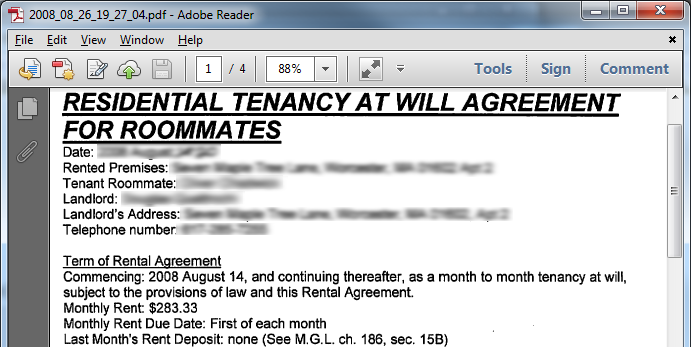What Makes for a Good Lease Agreement?
| . Posted in forms - 0 Comments
Did you know? In Massachusetts, written agreements with your tenants are not legally required! Well, why bother? Because it's a terrible, terrible idea to operate without one. In this article we'll offer some pointers you can use. Don't just grab any old lease off the Internet. We'll show you what makes for a good lease agreement.
Lease Agreement vs. Tenancy At Will
Okay, so you want a lease agreement. Or do you? In Massachusetts, leases usually restrict the landlord more than they restrict the tenant.
Advantages of a lease:
- The tenant can't move out in the middle of winter
Disadvantages of a lease:
- Landlord and tenant are stuck together for as long as the lease says
- If the tenant's circumstances change and they need to move back home, move for work, or get a bigger apartment, they'll be stuck and unhappy
- If your circumstances or attitudes change and you can't tolerate having the tenant in the apartment anymore, you're stuck and unhappy
- Eviction is uncertain and must rely on proving a specific "cause" to evict
Many successful landlords operate with what's called "tenancy at will," or a month-to-month agreement. If one ever gets sick of the other, they can get out of the arrangement with thirty days' notice. They can terminate the agreement just because they feel like it. That's in stark contrast with a lease, which may not end for nearly another whole year.
Minimum Clauses for Lease Agreements Overall
We recently spoke with a judge at a housing court here in Massachusetts. They advised that your agreement should have answers to the following questions. This is the bare minimum:
- Who's the landlord?
- Who is allowed to live there as a tenant?
- What's the rent and when is it due?
- Can they have a dog?
- Is there parking?
You can easily avoid heartburn later if you clearly decide whether pets and parking are allowed. Don't be afraid to set the rules early!
Other Good Ideas for Lease Agreements
Try to answer these questions as well:
- Who fixes stuff that breaks?
- Who pays for electricity?
- Who pays for gas?
- Who pays for water?
- Is it okay to leave things in the common areas?
- Does the landlord keep a key? When can they go into the apartment?
- Is subletting allowed?
Note that in Massachusetts, if the staircase or other common area lights are on the tenant meter, you must disclose that. Also, if the apartment doesn't have a separate water meter for the tenant's unit, you can't charge for water.
If you liked these pointers, sign up for our newsletter. We give free premium content away every month.





